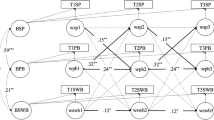Abstract
Research on age-related change in prosocial behavior from the preadolescent through adolescent years is usually limited to the question of whether the frequency of this behavior increases or decreases as children grow older. Frequency, however, is not consistently related to age. Data from existing research do not support the view that there is any simple unidirectional trend. Increases, no changes, and decreases have been found — depending on the behavior under scrutiny, the method of investigation, and the age group (cf. Radke-Yarrow, Zahn-Waxier & Chapman, 1983). Consequently, there is a growing belief that developmental profiles should be based on more qualitative dimensions; that studying change in the motivational base of prosocial behavior may resolve inconsistencies in earlier results (cf. Reykowski, 1982 a; Rushton, 1976). Yet few empirical studies have dealt with the issue of prosocial motivation directly; one of the few is the subject of the following report.
All studies were conducted in collaboration with a research group at the Polish Academy of Science (principal investigator: J. Reykowski). This research was supported in part by German Research Council Grant Si 296/1–1 through 4 (principal investigators: R. K. Silbereisen and K. Eyferth) and in part by a grant awarded to J. Reykowski by the Polish Academy of Science. The paper was prepared during a sabbatical leave made possible by German Research Council Grant Si 296/2-1 to R. K. Silbereisen. The authors thank Nancy Eisenberg for helpful comments on an earlier version of this chapter.
Access this chapter
Tax calculation will be finalised at checkout
Purchases are for personal use only
Preview
Unable to display preview. Download preview PDF.
Similar content being viewed by others
References
Alwin, D. F. (1984) Trends in parental socialization values: Detroit, 1958 to 1983. American Journal of Sociology, 90, 359–382
Atkinson, J. W. & Birch, D. (1978) Introduction to motivation. New York: Van Nostrand
Bandura, A. (1971) Psychological modelling. Chicago: Aldine
Battistich, V., Watson, M., & Solomon, D. (1983) Children’s cognitions about helping relationships. Paper presented at the annual meeting of the American Psychological Association, Anaheim, CA, August, 1983
Bentler, P. M. & Bonnett, D. G. (1980) Significance tests and goodness of fit in the analysis of covariance structures. Psychological Bulletin, 88, 588–606
Boehnke, K. & Silbereisen, R. K. (1984) Zur Entwicklung von Werthaltungen bei Jugendlichen. Forschungsberichte aus dem Institut für Psychologie der Technischen Universität Berlin (84–7)
Crockenberg, S. B., Bryant, B. K. & Wilce, L. S. (1976) The effects of cooperatively and competitively structured learning environments on inter- and intra-personal behavior. Child Development, 47, 386 – 396
Eisenberg, N. (1982) The development of reasoning regarding prosocial behavior. In: N. Eisenberg (Ed.), The development of prosocial behavior (pp. 219–249). New York: Academic
Eisenberg, N., Boehnke, K., Schuhler, P. & Silbereisen, R. K. (1985) The development of prosocial behavior. Journal of Cross-cultural Psychology, 16, 69–82
Eisenberg, N. (1979) The development of children’s prosocial moral judgment. Developmental Psychology, 15, 129–137
Hebb, D. O. (1949) The organization of behavior. New York: Wiley
Hoffman, M. L. (1970) Moral development. In: P. Mussen (Ed.), Handbook of child psychology. New York: Wiley
Hunt, J. McV. (1965) Intrinsic motivation and its role in psychological development. In: D. Levine (Ed.), Nebraska symposium on motivation. Lincoln: University of Nebraska Press
Jöreskog, K. G. & Sörbom, D. (1981) Lisrel V user’s guide. Chicago: International Educational Services
Karylowski, J. (1982) Two types of altruistic behavior: Doing good to feel good or to make the other feel good. In: V. Derlega & J. Grzelak (Eds.), Cooperation and helping behavior (pp. 397–413). New York: Academic
Kohn, M. L. (1981) Personality, occupation, and social stratification: a frame of reference. In: D. J. Treiman & R. V. Robinson (Eds.), Research in social stratification and mobility, vol. 1 (pp. 267–297). New York: JAI
Kohn, M. L. & Schooler, C. (1973) Occupational experience and psychological functioning: An assessment of reciprocal effects. American Sociological Review, 38, 97–118
Miller, N. E. & Dollard, J. (1972) Social learning and imitation. New Haven: Yale University Press
Mowrer, V. H. (1960) Learning theory and the symbolic processes. New York: Wiley
O’Connor, M., Cuevas, J., & Dollinger, St. (1981) Understanding motivations behind pro-social acts: A developmental analysis. Journal of Genetic Psychology, 139, 267–276
Radke-Yarrow, M., Zahn-Waxier, C., & Chapman, M. (1983) Children’s prosocial dispositions and behavior. In: P. Mussen (Ed.), Child psychology, vol. IV (vol. ed., E. M. Hetherington) (pp. 469 – 545) New York: Wiley
Reykowski, J. (1982 a) Motivation of prosocial behavior. In: V. Derlega & J. Grzelak (Eds.), Cooperation and helping behavior (pp. 357–376). New York: Academic
Reykowski, J. (1982 b) Development of prosocial motivation: A dialectic process. In: N. Eisenberg (Ed.), The development of prosocial behavior (pp. 377–394). New York: Academic
Rushton, J. (1976) Socialization and the altruistic behavior of children. Psychological Bulletin, 83, 898–913
Staub, E. (1978) Positive social behavior and morality. Social and prosocial influences, vol. 1. New York: Academic
Zajonc, R. B. (1968) Cognitive theories in social psychology. In: G. Lindzey & E. Aronson (Eds.), The handbook of social psychology (pp. 320–411). New York: Addison-Wesley
Zajonc, R. B. (1980) Feeling and thinking: p need no inferences. American Psychologist, 35, 151–175
Author information
Authors and Affiliations
Editor information
Editors and Affiliations
Rights and permissions
Copyright information
© 1986 Springer-Verlag Berlin Heidelberg
About this chapter
Cite this chapter
Silbereisen, R.K., Boehnke, K., Reykowski, J. (1986). Prosocial Motives from 12 to 18: A Comparison of Adolescents from Berlin (West) and Warsaw. In: Silbereisen, R.K., Eyferth, K., Rudinger, G. (eds) Development as Action in Context. Springer, Berlin, Heidelberg. https://doi.org/10.1007/978-3-662-02475-1_8
Download citation
DOI: https://doi.org/10.1007/978-3-662-02475-1_8
Publisher Name: Springer, Berlin, Heidelberg
Print ISBN: 978-3-662-02477-5
Online ISBN: 978-3-662-02475-1
eBook Packages: Springer Book Archive




